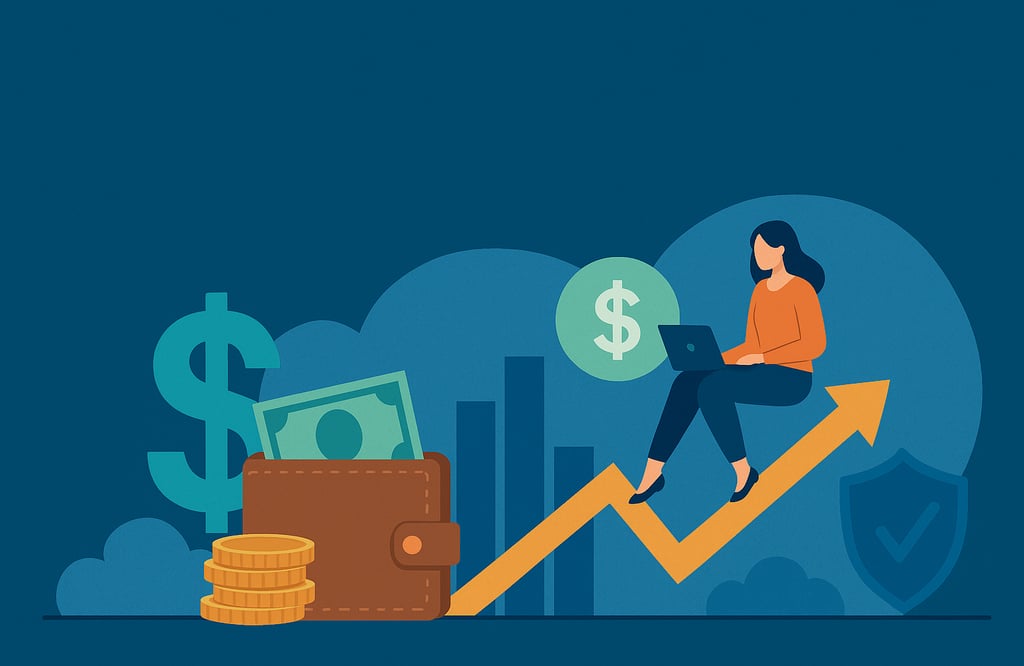How to Organize Your Personal Finances in Times of Crisis
Learn how to organize your personal finances in times of crisis with practical and realistic strategies. Discover how to reduce expenses, create a survival budget, build an emergency fund, and develop a strong financial mindset to stay balanced even during economic instability. This complete guide will help you take control of your money, find new income opportunities, and build a more stable and sustainable financial future.
10/23/20253 min read


In times of economic downturn, political instability, or rising living costs, many people feel the weight of financial imbalance. When salaries fail to keep up with inflation and bills seem to multiply, it’s normal to feel anxious. But here’s the good news: with planning, control, and discipline, it’s absolutely possible to organize your finances and regain balance — even in the toughest times.
Organizing your money isn’t just about cutting expenses. It’s about creating a smart strategy to make the most of your resources, ensuring that every dollar has a purpose and brings tangible results.
1. Assess Your Current Financial Situation
Before taking action, you must understand where you stand. Grab a notebook, spreadsheet, or app and write down all your income and expenses — salary, side earnings, fixed bills, groceries, leisure, and debts.
When you visualize everything in one place, you’ll quickly see where your money is actually going and identify waste. This financial diagnosis is the first step toward building an effective and realistic plan.
💡 Tip: Use apps like Mobills, YNAB (You Need A Budget), or Mint to track your finances easily.
2. Cut Unnecessary Expenses and Renegotiate Debts
During crises, prioritizing essentials is key. Review all your spending and ask yourself, “Do I really need this right now?”
Cancel subscriptions you barely use.
Swap expensive entertainment for free or low-cost alternatives.
Reevaluate your internet, phone, and streaming plans — you might find cheaper options.
If you’re in debt, reach out to creditors to renegotiate. Many financial institutions offer special repayment terms during crises, such as lower interest rates or extended payment plans.
3. Build a Survival Budget
In difficult times, your budget must be both realistic and flexible. Create a plan focused on essential expenses such as housing, food, health, and transportation.
Try adapting the 50/30/20 rule to fit your situation:
50% for basic needs (bills, food, housing)
30% for variable expenses and moderate leisure
20% for saving, investing, or debt repayment
If your income is tight, adjust these percentages — but never eliminate savings completely. Even a small amount builds the habit and provides security.
4. Build (or Rebuild) an Emergency Fund
An emergency fund is the foundation of financial security. It covers unexpected events like job loss, illness, or urgent repairs.
Ideally, you should save three to six months of your fixed monthly expenses in a liquid account, such as a savings account or a daily liquidity investment (like a money market fund).
Even if it takes time, start small — saving $10 or $20 a week is better than waiting for “the right time.”
5. Explore Alternative Income Streams
Crises can also bring new opportunities. Use your skills and creativity to generate extra income:
Sell products or services online (Etsy, eBay, Instagram).
Offer tutoring, consulting, or freelance work.
Create digital products like e-books or online courses.
Having multiple income sources reduces dependence on your main job and strengthens your financial resilience.
6. Learn About Investing — Even With Little Money
Investing is one of the most powerful ways to protect and grow your wealth, especially when inflation is high.
Today, you can start investing with small amounts in options like government bonds, CDs, index funds, or ETFs.
The key is to learn before you invest. Understand your risk profile, start safely, and build confidence over time. Financial education turns uncertainty into opportunity.
7. Develop a Strong Financial Mindset
Finally, your mindset is your most valuable asset in a crisis. Avoid negativity, stay focused on solutions, and practice discipline daily.
Financial balance doesn’t come from luck — it’s built through consistent habits and emotional control.
Remember: crises are temporary, but financial knowledge lasts forever.
💡 Conclusion
Organizing your finances during tough times isn’t easy, but it’s entirely possible. With planning, discipline, and awareness, you don’t just survive — you grow.
Use this moment to build strong foundations, gain control over your money, and create a financially stable and sustainable life.
🔔 Final Tip: Start today, even with little. Small daily actions compound into great achievements over time.